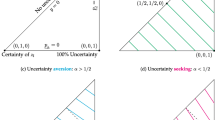Abstract
When facing situations involving uncertainty, experts might provide imprecise and conflicting opinions. Recent experiments have shown that decision makers display aversion towards both disagreement among experts and imprecision of information. We provide an axiomatic foundation for a decision criterion that allows one to distinguish on a behavioral basis the decision maker’s attitude towards imprecision and disagreement. This criterion accommodates patterns of preferences observed in experiments that are precluded by two-steps procedures, where information is first aggregated, and then used by the decision maker. This might be seen as an argument for having experts transmitting a more detailed information to the decision maker.
Similar content being viewed by others
References
Cabantous L (2007) Ambiguity aversion in the field of insurance: insurers’ attitude to imprecise and conflicting probability estimates. Theory Decis 62: 219–240
Cabantous L, Hilton D, Kunreuther H, Michel-Kerjan E (2011) Is imprecise knowledge better than conflicting expertise? Evidence from insurers’ decisions in the United States. J Risk Uncertain 1–22
Chambers C, Echenique F (2009) When does aggregation reduce risk aversion? mimeo
Chateauneuf A (1991) On the use of capacities in modeling uncertainty aversion and risk aversion. J Math Econ 20: 343–369
Clemen R, Winkler R (2007) Aggregating probability distributions. Advances in decision analysis: from foundations to applications, pp 154–176
Cooke RM (1991) Experts in uncertainty: opinion and subjective probability in science. Oxford University Press, New York
Cooke WE (1906) Forecasts and verifications in Western Australia. Monthly Weather Rev 34(1): 23–24
Crés H, Gilboa I, Vieille N (2011) Aggregation of multiple prior opinions. J Econ Theory 146(6): 2563–2582
Debreu G (1954) Representation of a preference ordering by a numerical function. In: Thrall RM, Coombs CH, Davis RL (eds) Decision processes. Wiley, New York, pp 159–165
Gajdos T, Tallon J-M, Vergnaud J-C (2004) Decision making with imprecise probabilistic information. J Math Econ 40: 647–681
Gajdos T, Hayashi T, Tallon J-M, Vergnaud J-C (2008a) Attitude toward imprecise information. J Econ Theory 140(1): 27–65
Gajdos T, Tallon J-M, Vergnaud J-C (2008b) Representation and aggregation of preferences under uncertainty. J Econ Theory 141(1): 68–99
Genest C, Zidek J (1986) Combining probability distributions: a critique and an annotated bibliography. Stat Sci 1: 114–148
Gilboa I, Schmeidler D (1989) Maximin expected utility with a non-unique prior. J Math Econ 18: 141–153
Gilboa I, Samet D, Schmeidler D (2004) Utilitarian aggregation of beliefs and tastes. J Polit Econ 112: 932–938
Harsanyi J (1955) Cardinal welfare, individualistic ethics, and interpersonal comparisons if utility. J Polit Econ 63: 309–321
Kriegler E, Hall J, Held H, Dawson R, Schellnhuber H (2009) Imprecise probability assessment of tipping points in the climate system. Proc Nat Acad Sci 106(13): 5041–5046
McConway K (1981) Marginalization and the linear opinion pools. J Am Stat Assoc 76(374): 410–414
Mongin P (1995) Consistent Bayesian aggregation. J Econ Theory 66: 313–351
Morris P (1974) Decision analysis expert use. Manag Sci 1233–1241
Morris P (1977) Combining expert judgments: a Bayesian approach. Manag Sci 679–693
Nascimento L (2012) The ex-ante aggregation of opinions under uncertainty. Theor Econ
Nau R (2002) The aggregation of imprecise probabilities. J Stat Plan Inference 105(1): 265–282
Rennie D (1981) Consensus statements. New Engl J Med 304(11): 665–666
Savage L (1954) The foundations of statistics. Wiley, New York
Smithson M (1999) Conflict aversion: preference for ambiguity vs conflict ins sources and evidence. Org Beha Hum Decis Process 79: 179–198
Stone M (1961) The opinion pool. Ann Math Stat 32: 1339–1342
Troffaes M (2006) Generalizing the conjunction rule for aggregating conflicting expert opinions. Int J Intel Syst 21(3): 361–380
Wagner C (1989) Consensus for belief functions and related uncertainty measures. Theory Decis 26: 295–304
Author information
Authors and Affiliations
Corresponding author
Rights and permissions
About this article
Cite this article
Gajdos, T., Vergnaud, JC. Decisions with conflicting and imprecise information. Soc Choice Welf 41, 427–452 (2013). https://doi.org/10.1007/s00355-012-0691-1
Received:
Accepted:
Published:
Issue Date:
DOI: https://doi.org/10.1007/s00355-012-0691-1




